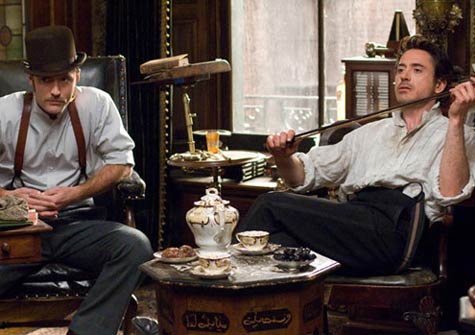
On December 24th of 2009—long, long ago, eons past, before Benedict Timothy Carlton Cumberbatch elevated Belstaff winter wear to the crown prince’s robes of Sherlockian culture—Roger Ebert wrote a review of Guy Ritchie’s hotly anticipated film Sherlock Holmes, starring Robert Downey Jr. and Jude Law. “The less I thought about Sherlock Holmes,” he said, writing for the Chicago Sun-Times, “the more I liked Sherlock Holmes.”
It’s a fair assessment. The film is a grimy pageant of pseudo-Victorian steampunkery, in which murder, melodrama, mayhem, and yes, an ever-so-slight thread of mystery, too, are churned together into a gloriously gritty Sherlockian piña colada. That the film isn’t thoughtful is largely irrelevant—it’s cracking good fun, and most critics agreed that the fact things hardly ever exploded in Sir Arthur Conan Doyle’s sixty-tale series is no reason why things should not explode now. Sherlock Holmes, he of the masterful intellect and the cherrywood pipe, can exist in a world where things explode indiscriminately and not suffer much by it. The question now seems to be, will Sherlockians remain pleased with Downey’s manic wit and the explosions surrounding him, when the BBC series Sherlock is also cracking good fun, and deeply thoughtful to boot?
Inevitable comparisons will be made, and sides taken, though we rabid followers of the Great Detective are happy to absorb all new Holmes content indiscriminately and with pleasure. We’re grateful to be alive these days. The seventies likewise saw an upsurge in Holmes’s popularity, what with films like Murder by Decree and bestselling pastiches like Nicholas Meyer’s The Seven Percent Solution. But now! Oh, to be alive now! Holmes is a hit television series, a Warner Brothers franchise, and the subject of more pastiches than ever—and let’s not even try to measure the passion with which he is fangirled online.
Ritchie is to be lauded for taking a famously intellectual character and fleshing out some of his rougher bits, for there are certainly filmgoers whose eyes would glaze over if I stood before them and eagerly explained that, quite apart from his love of crime solving, Holmes was also interested in ancient Cornish dialects, owned a pocket Petrarch, and studied the polyphonic motets of Lassus. To polyphonic motets, Ritchie’s answer is BOOM!!!
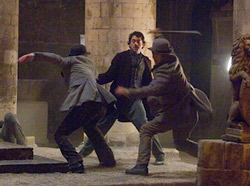
Ebert went on to say that, while Sherlock Holmes would be lauded by action fans, it wasn’t likely to garner block bookings from the Baker Street Irregulars (also known as BSI). He was flat wrong, wrong on a John-Watson-exists-to-trip-on-banana-peels level. I went to an advance screening last year with fellow BSI, and saw the movie twice thereafter in the theatre. Not everyone liked it, of course. Some thought the film too frenetic and flashy to showcase a famously dispassionate genius, or were off put by the admittedly histrionic plot. But the majority of Sherlockians I’ve spoken with about the Downey incarnation, both online and in person, are perfectly sanguine about Sherlock Holmes’s transformation into an action hero. He was an action hero.
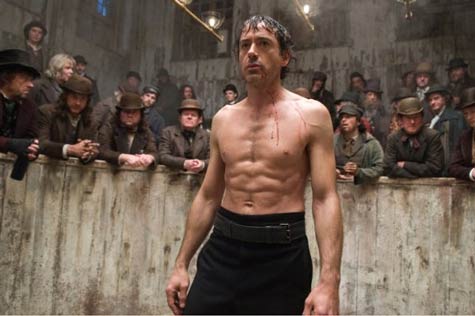
He knew (and used) martial arts, was an amateur (but formidable) boxer, and could (but didn’t often) straighten bent steel pokers. Holmes got in fistfights, and when the skirmish was fair, he won. When Downey’s Holmes fights, “deducing” the moves of his competitors and anticipating them, many geeky BSI hearts go pitter-pat. Mine certainly does. Famed Sherlockian annotator Leslie S. Klinger, also of the BSI, consults with the filmmakers, steering them away from error to the best of his encyclopedic ability, and the results are largely admirable. It’s the gloss and bluster and sheer budget of these films, the explosions and the sword sticks and the exploding sword sticks, that prevent them from being taken as seriously as their stunningly apt BBC competition.
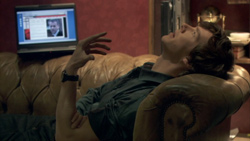
The Ritchie version takes the requisite ingredients of high adventure, manic genius, and brothers in arms, gives them a hard cocktail shake with a slug of gin and some embalming fluid tossed in for good measure, amps them all up to eleven and then shoots the mix from a cannon. I don’t dislike this fact, but it alters the mood. Tonally, the films appear to be so desirous of delivering a slap-in-the-ass good time that they begin to verge on camp. In at least one way, that’s a step in the right direction: Sherlock Holmes as written by Doyle was a very, very funny man. Yes, he was a loner iconoclast, but his amused asides to Dr. Watson and to the official police are often priceless gems of wit served cold. Lestrade remarks to Holmes in “The Boscombe Vally Mystery” that he finds it hard enough to tackle facts without “flying away after theories and fancies.” “You are right,” Holmes answers, all sunshine and sweetness, “you do find it very hard to tackle the facts.”
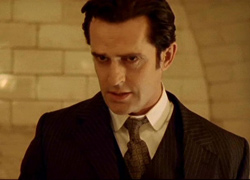
Anger.
Brood, brood.
Brood, anger, anger, loneliness.
Drugs.
Brood.
It doesn’t wash. A humorless Holmes rings false every time, and the Ritchie adaptation can’t be accused of getting this all too often neglected aspect of the character wrong. As a matter of fact, one of my favorite moments of character insight in any Sherlock Holmes screen adaptation occurs in the first Ritchie film. Downey’s Holmes sits in a restaurant awaiting his friend and his friend’s new fiancée. Suddenly, alone at a table, the influx of information becomes too much for him. He hears everything, sees everything, knows everything there is to know about complete strangers, hears the clink of every spoon and at once is aware of whether it was manufactured in Manchester or Liverpool, and he can’t shut it off.
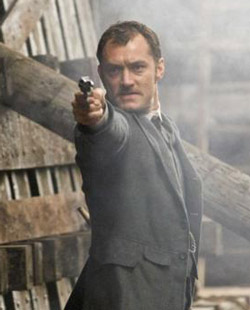
In contrast to a world full of fireworks and mayhem and the sharp blades of sword sticks, Cumberbatch’s Holmes owns a mind every bit as glittering and intent. There’s a saying in theatre that the work shouldn’t show—if you’re good enough, deft enough, it won’t look like work at all. You can’t see Cumberbatch or Freeman working, which leads to an immersive experience despite the modernity of the context. Downey and Law, formidable talents in their own right, are forced to exchange affectionate barbs at such a frenetic pace that the New Yorker called their relationship a marriage from a classic screwball comedy and Joe Morgenstern termed their dialogue “lovers’ spats.” Let me be clear that the previous reviews were complimentary, not denigrating.
It is highly entertaining to watch Law and Downey go at it like cats. But I’d argue it is mesmerizing to watch Freeman stare at Cumberbatch as if he’s some sort of alien life form. There is an obvious difference in acting choices at work here—while a slightly mystified Benedict Cumberbatch has spoken of being thanked by appreciative asexuals for his work in Sherlock, Downey has called Holmes and Watson “two men who happen to be roommates, wrestle a lot, and share a bed.” Downey’s flat refusal to kowtow to hetero-normative Hollywood led to a spate of alarming homophobic buzz last time around, and one which I pray will not be repeated. Whether or not Holmes was sexual—straight, gay, bi, what have you—he was “the best and wisest man” Watson had ever known, period. End of subject.
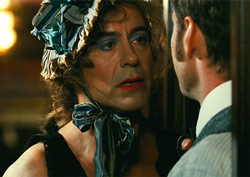
BBC’s Sherlock is nearly set to air three new episodes, rumored to be landing in January. With Game of Shadows primed for release December 16th, the world of Sherlockiana is positively aglow in anticipation of both incarnations. Well. When I say “aglow,” I more likely mean “burning with the bright, bright burning of incandescent nuclear flame.” Whatever the ultimate verdicts regarding the quality of these very different versions, I’m delighted to be around to see all of them, and nearly back to back, no less. It’s proof positive that Sherlock Holmes is a crimesolver for the ages that two such very disparate and yet enjoyable portraits of him should be painted in the same year. Bring it on, I say. Pile up the sequels and the seasons and then make us more. And if Game of Shadows gives us a rattier Holmes, one who is shorter than Watson and not quite so “catlike” in his personal hygiene as we are used to, what of it? We know that Holmes is here to fight in our stead, to bring order out of chaos and to solve the indecipherable, and unruly hair didn’t hamper him the last time. Whether he battles with fists or with logic, he’s the most watchable crusader we’ve got.
Lyndsay Faye, author of Dust and Shadow and The Gods of Gotham, coming Winter 2012 from Amy Einhorn Books/Putnam. She tweets @LyndsayFaye.

Brilliant! I especially liked the last touch on Ritchie’s Holmes having less of a cat-like personal hygiene.
Excellent. It seems that a lot of people who deride more modern adaptations for focusing on the “action” elements of Holmes forget that the original stories were written to be slightly pulpy adventure stories, not great literature. Yes, Holmes uses his brain, but he isn’t above unbending that poker or throwing that evil mathematician into a waterfall when the situation warrants.
Wonderful article, and written no less by the author of one of the finest Holmes pastiches written in decades, and absolutely the finest execution of the concept of Holmes on the trail of Jack the Ripper written ever. I can’t wait for either the new film or next series of the BBC drama, both of which contributing to this being the greatest time to be a Sherlock Holmes fan since Doyle was alive and writing him.
Great article; saw the movie – loved it! Having read your article I now hope to be able to see the BBC drama as well. I agree that all incarnations of Mr. Holmes and Dr. Watson usually provide an entertaining ride. I even love the old, old version with Basil Rathbone and Nigel Bruce in the Holmes/Watson roles respectively. As for Game of Shadows: Bravo Guy, Robert, and Jude!! Can’t wait for the next one!